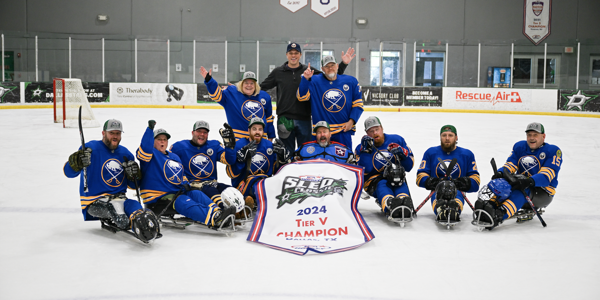“Every single one of our players has a goal or an assist at this tournament,” said Carolyn Frank, a U.S. Army veteran and the Sabres’ team captain. “We are all one team, fighting one fight out there. The camaraderie is unmatched. We pick each other up. We got each other’s six.”
The camaraderie between teammates is a constant theme for the squad, and their military backgrounds are strongly reflected in how they play on the ice.
“In the military, we are all battle buddies, and out on the ice we are battle buddies,” said James Whitaker, a U.S. Army veteran who is nearing one year since joining the sled hockey program.
Jake Gonta, the team’s head coach and manager, sees the deep bond his players share in how they can effectively communicate on- and off- the ice.
“The vets, when you talk about their military history, it’s a bond they share with the people that they served with,” Gonta said. “There’s that level of relatability with one another that adds another layer of chemistry.”
Even more importantly, the success of the program extends far beyond the team’s winning on the ice.
“I’ve seen a lot of improved mood – on- and off- the ice,” Gonta said. “It gives players a new sense of purpose, and since joining they just get out and start doing more. It definitely gives them a boost.”
For Frank and others, reassimilating to society after finishing their military service was a real challenge, but sled hockey has helped to overcome that.
“As soon as I got in a (sled hockey) bucket and got out there, everyone embraced me. You could feel that camaraderie, and they accepted me right away,” said Frank. “It saved my life. I was in some dark places, and I know a lot of my teammates will tell you the exact same story. It gives us meaning and something to do. It doesn’t just help us mentally, but physically as well, it keeps us active.”
Whitaker echoed Frank, stating, “It really gave me a new purpose, something to do. I got to meet people I wouldn’t have otherwise met. It gets me out of the house, which is a big problem for vets returning to society.
“PTSD and TBIs (Traumatic Brain Injuries) can cause people to shut themselves in, feel like there’s nobody else like them. Now I’m on a team where everyone else is just like me in one way or another.”
As the Buffalo Sabres Sled Vets continue to change lives within their program, their positive impact is felt throughout the entire sled hockey community as well, especially amongst fellow veterans.
“I’ve come across a lot of veterans on other teams. They pick up on the fact that we are a veteran team, and by the middle of the game we are chatting it up out there,” said Whitaker.
His teammate, U.S. Army National Guard veteran David Paolini, added, “The culture is awesome, the sled hockey community is great. We’re all a family, we all want to go out there and put everything on the line, just like how we did overseas.”
After taking home the Tier V championship, Whitaker immediately began the 20-plus hour drive from Farmers Branch back home to Buffalo, where he was honored by the NHL’s Buffalo Sabres for his service during a game against the Montreal Canadiens on Veteran’s Day (Monday, Nov. 11).
Frank and her teammates hope to see more veteran involvement in the sport in the future, as well as continued support for veterans everywhere.
“If you see a vet, thank them.”



